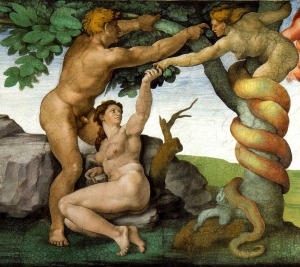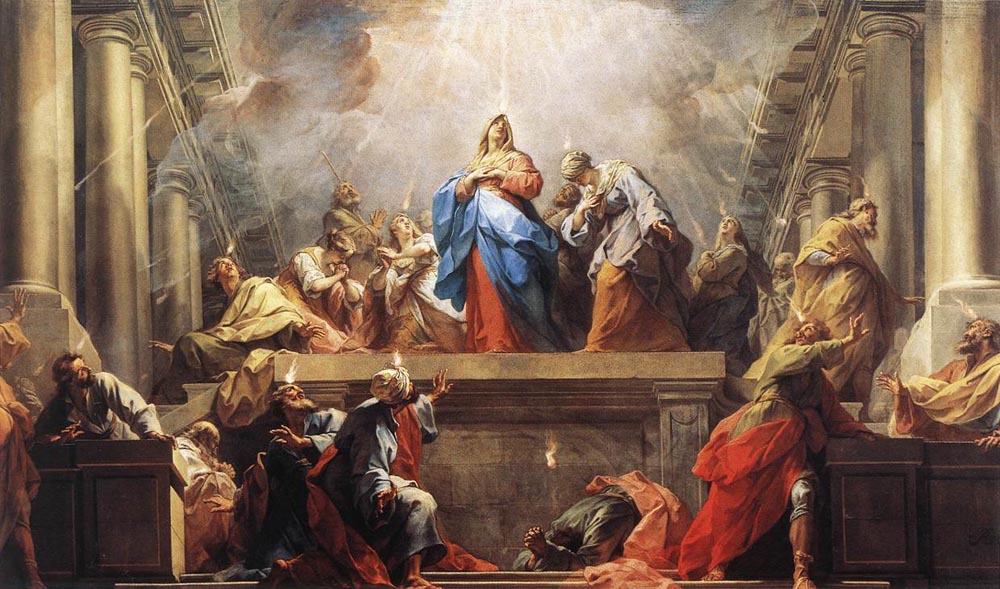This is perhaps the stickiest subject in Christianity, possibly because it is the most other-worldly. That is, it is the thing about the nature of God that seems to be the most difficult to get our heads around, precisely because it is the matter that is the least like the things we see around us.

Think about this for a second. Consider the following. Jesus was a great believer in teaching with parables. That is, he would use the things we see around us on a daily basis to explain the things that
we can't possibly understand. He would use lost coins, wandering sheep, pearls in the ocean and money buried in a field, all to talk about the kingdom of God. He would discuss himself as a good shepherd, as the door to the sheep pen, as the vine whilst we are the branches. All good stuff, because it uses things that we know to explain what we don't.
But somewhere that Jesus doesn't use images, doesn't use metaphor or simile, doesn't use parables, is with the Trinity. Now, obviously, if it was as simple as giving it the shamrock shake, or as straightforward as explaining it like an egg, then he would have. But he doesn't. These are all things that we have had to use ourselves to try to explain the Trinity, but because they aren't divine, they are going to have problems, and they're going to break down.
The Trinity is by its very nature not of this world. Understanding the big questions about it, asking who Jesus is talking to when he prays, asking how the Holy Spirit fits into everything, well, that's all complicated, to be sure, and it resists our efforts to rapidly find a way to explain it in terms of things we get, and things we understand readily. The reason, once again, being that it exists outside what we have around us at hand.
The absolute best way I've ever heard it explained is from Dorothy Sayers, who talks about the mind of the maker, being a discussion of the nature of God as understood through the lens of the creative process. Dorothy Sayers herself was an author, both of fiction and of nonfiction, and her understanding that she used was to talk about God as being someone who made things, like we write or compose or create. And understanding creation in that way would help to clarify the difficulty we see in explaning the Trinity while we are stuck in this world.
Think of this world as a play. Think of this world as a play, conceived by an author, and produced on a stage. Now try to imagine the world from the point of view of the characters, not of the actors. Try to imagine the world that the characters are living in, and trying to explain to them that the world they see around them is fake, that it is a simulation of the real world, but that it isn't anything real. Oh sure, the set seems real to them, they're acting as though it is, but it's not. This isn't the real world. Now, imagine telling the characters who are in the play that there is a real world out there, a world not made out of crepe paper and styrofoam, a world where the trees are made of wood, not of papier mache. What would they feel to learn that there was a real world where the sun gave light instead of Frenells. How would they feel to learn that there was a world beyond the proscenium, where there were people who watched the play for an hour and then left, and went to a world that wasn't locked to the size of a stage, but was the size of the entire world, where they could go where they wanted, do what they wanted, where they could go and see other plays, and even be in plays themselves! Imagine how they characters would react if you told them that out there, somewhere in a world beyond the limits of the stage, was an author who had conceived of their entire world, who had written their lines of dialogue, and who had worked out what was going to happen long before the play was rehearsed.
How would those characters react? how would they see their place in the world knowing that this is the case? Would they be able to understand the concept of the author? What if the author, who was also a director, starred in the play himself, and was able to tell them about the world that was to be found outside? What would they do? How would they take it? It's not as small as you think it is, either, not really. It's far more complicated than you think it is, given that the characters in the play would have no idea what it was like to be born, to grow up, to have children, to eat real food and drink real drinks, any of these things that we go through in the course of our lives? How would they take it? Odds are, they couldn't possibly conceive of it.
That's what we have in the Trinity. We have the author, who conceived of the play as God the Father, creating the world and the people in it essentially out of nothing. Then we have the director, God the Spirit, who tells the characters what the author has in mind. He gives direction, and guides the members of the chorus, the leads, everyone in a real way to ensure that the play goes the way it was supposed to. and then we have the actor, God the Son, the one who enters into the world of the play, and who lives according to its rules. The tragic hero, the one who suffers, the one who dies, and as far as the other characters know, dies for real. In their world, he perishes.
But here's the score. The actor, the son, knows of a larger world out there. He knows of a bigger world out there not limited to the stage, not limited to the world that is stuck beneath the lights. He knows of a world that is lit by the sun, the world that he came from, and the world that he is going back to. And he has promised that one day he will make it so that the characters playing in that play, not the actors but the characters, who only exist in that play, will be able to walk off that stage and into the real world, where they can choose where they want to go and what they want to say. No lines, no script, just life.
How would they take it? Well, we assume that they'd take it well, but were' not basing that on anything. More likely than not, they wouldn't believe it, or would find there was no way for them to imagine it. Everything that the Son could do to tell them about the world he had come from would be confusing for them, because it would sound like their world, but would be impossible for them to conceive of. There would be only so much that the Son, the actor in the play could do to explain the situation to them by relating it to what they see around them, before saying that there is ultimately so much that they could never ever work out, so they'll have to take what he says on faith.
For us, the Trinity works like that. We have the Lord our God who made everything, who fashioned the world out of nothing, and placed it here, in this universe. This wasn't where it had to be, but this is where he chose it to be. He made the world, and made the rules that govern the world. He placed it into the universe, and chose how it was going to work . Then he placed into it the people that he was going to love and cherish, that he was going to watch work and grow. And then they sinned, and caused the destruction of the world around them.
So God sent his son into the world, to take on flesh and dwell among us, to live as we live, to grow as we grow, to exist goverend by the rules that he had made yet had never been bound by, he placed himself into this world and lived and died based on rules that he absoultely did not need to follow. But he did so becuase he loves and cares for us, and wants us to break us out of the stage, away from the death that awaits us, and into the real world that until now only he has known. What is that real world? It's too hard for him to explain, because it's far far beyond what we can imagine. The characters in a novel can't imagine what it is like off a page. The characters in a movie can't imagine what it's like to be anywhere but on film. We can't really conceive of heaven. And we can't conceive of a God who made everything entering into human history to guide and redeem us.
But that's the story of the scriptures. And to be a Christian means that you know that it's not just the story of the scriptures, it's the story of us. It's our story as children of God and people who are in history. That means that the creeds aren't the story of creation and redemption and sanctification of the human race, or of Israel, or of the disciples, they're our story too. The dogma is the drama, and it's the drama of humanity. It's the drama of our story, the story of humanity that lives with God, and cherishes him because of what he has done for us. It's the story of God creating you, redeeming you, and making you holy through his means of grace. That's why it's such an important thing to be immersed in - because it's not the story of the past, it's not a dead document. It's the story of today. And it's vibrant, burning flame.




